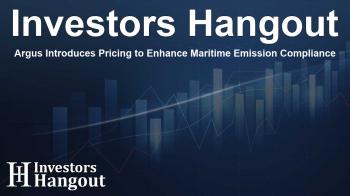Argus Introduces Pricing to Enhance Maritime Emission Compliance

Argus Launches New Prices for Greenhouse Gas Compliance
In a significant move towards promoting environmental sustainability in the maritime industry, Argus, a global leader in energy and commodity price reporting, has introduced two innovative calculated prices. These prices are a critical response to the FuelEU Maritime regulation, aimed at reducing greenhouse gas emissions from ships operating in European waters.
Understanding the FuelEU Maritime Regulation
The FuelEU Maritime regulation stipulates a progressive reduction in greenhouse gas emissions from ships, beginning with a minimum target of a 2% reduction by 2025, subsequently increasing to an ambitious 80% by the year 2050. This initiative necessitates that shipowners and charterers adapt to new compliance requirements, significantly impacting operational strategies within the industry.
Cost of Compliance Calculations
Argus's new prices quantify the cost associated with reducing one tonne of CO2 equivalent by adopting used cooking oil methyl ester (Ucome) as an alternative to traditional fuels such as marine gasoil or very-low sulphur fuel oil. This innovation aims to bring clarity and transparency to a compliance market that has emerged in the wake of the FuelEU Maritime regulation.
The Compliance Pooling Mechanism
One noteworthy aspect of this regulation is the pooling mechanism it introduces. Shipowners who achieve GHG savings beyond the required 2% can sell their surplus compliance to those who may not meet their targets. This flexible system enables fleet-wide aggregation, allowing companies to optimize compliance across their operations.
Strategic Decisions Using New Pricing
Shipowners can leverage these new calculated prices to make informed decisions about whether to sell their compliance credits, save them for future use, or pay penalties for not meeting the reduction targets. This practical application of pricing enhances decision-making throughout short-term and long-term charter agreements.
The Financial Landscape of Compliance
The introduction of these prices also highlights a pivotal financial landscape. Currently, the cost associated with purchasing additional compliance is significantly lower than the penalties imposed for non-compliance, providing a powerful incentive for companies to actively engage in emission reduction practices.
Feedback from Industry Leaders
According to Adrian Binks, chairman and CEO of Argus Media, "We have developed these new compliance cost prices based on requests from shipping industry participants. There is a real need for an accurate marker for the cost of compliance, allowing companies to allocate resources efficiently and effectively. Many organizations have expressed their intention to incorporate these prices into their contracts and long-term planning strategies."
Daily Availability of Pricing Information
These newly established FuelEU Ucome-MGO and FuelEU Ucome-VLSFO abatement prices will be published daily, available in both €/t CO2e and $/t CO2e. Interested parties can access this information in the Argus Biofuels and Argus Marine Fuels reports, which serve as essential resources in the market.
About Argus Media
Argus Media stands as a premier independent provider of market intelligence to the global energy and commodity sectors. The company specializes in delivering essential price assessments, analytics, and consulting services that illuminate complex market dynamics. With a head office in London and a talented team of 1,500 professionals, Argus has established a robust presence across 30 global commodity trading hubs.
Globally, the data provided by Argus is trusted by companies, trading firms, and governmental bodies in 160 countries for critical decision-making, situation analysis, risk management, and long-term strategic planning. Founded in 1970, Argus remains a privately held enterprise owned by a collective of employee shareholders and the global growth equity firm General Atlantic.
Frequently Asked Questions
What is the purpose of the FuelEU Maritime regulation?
The regulation aims to gradually reduce greenhouse gas emissions from ships, enhancing environmental sustainability in European waters.
How do Argus's new pricing models work?
The new calculated prices allow shipowners to evaluate the cost of compliance for emissions reductions, offering a transparent view of the market.
What options do shipowners have under the compliance mechanism?
Shipowners can sell surplus compliance credits, save them for future use, or choose to pay penalties for non-compliance.
What are the potential financial implications for shipowners?
With the new pricing, purchasing additional compliance is presently cheaper than facing penalties, motivating companies to reduce emissions.
How can industry participants access the pricing information?
The new prices are published daily in the Argus Biofuels and Argus Marine Fuels reports, accessible to relevant stakeholders.
About The Author
Contact Lucas Young privately here. Or send an email with ATTN: Lucas Young as the subject to contact@investorshangout.com.
About Investors Hangout
Investors Hangout is a leading online stock forum for financial discussion and learning, offering a wide range of free tools and resources. It draws in traders of all levels, who exchange market knowledge, investigate trading tactics, and keep an eye on industry developments in real time. Featuring financial articles, stock message boards, quotes, charts, company profiles, and live news updates. Through cooperative learning and a wealth of informational resources, it helps users from novices creating their first portfolios to experts honing their techniques. Join Investors Hangout today: https://investorshangout.com/
The content of this article is based on factual, publicly available information and does not represent legal, financial, or investment advice. Investors Hangout does not offer financial advice, and the author is not a licensed financial advisor. Consult a qualified advisor before making any financial or investment decisions based on this article. This article should not be considered advice to purchase, sell, or hold any securities or other investments. If any of the material provided here is inaccurate, please contact us for corrections.

